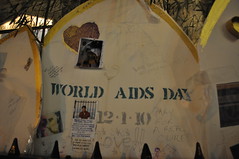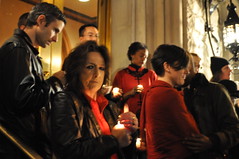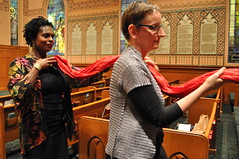 Meredith Hoffman Top: Jacqui Lewis, left, and Tricia Sheffield grasp a red cloth dedicated to victims of AIDS during a Wednesday night ceremony at Middle Collegiate Church commemorating World AIDS Day.
Meredith Hoffman Top: Jacqui Lewis, left, and Tricia Sheffield grasp a red cloth dedicated to victims of AIDS during a Wednesday night ceremony at Middle Collegiate Church commemorating World AIDS Day.Debbie Totten knows about loss.
Four years ago, her brother Frank committed suicide after learning that he had contracted AIDS. “He had the beginnings of AIDS but he took his own life,” said Ms. Totten, a 53-year-old native of the East Village. Two years later, her brother’s friend also committed suicide when he learned that he, too, had AIDS.
On Wednesday night, Ms. Totten and 25 fellow congregants silently held candles in Middle Collegiate Church during a worship service to commemorate World AIDS Day.
And though the service’s message was of hope, the story of Ms. Totten and many others was of loss, with entire past communities gone, because of AIDS.
“There’s nobody here anymore I grew up with. Most of them passed away from the virus,” said Ms. Totten. While most of her friends contracted HIV back in the 70’s, she said that she’s known even more infected people in the neighborhood in recent years.
Every Monday with Middle Church Ms. Totten volunteers, giving hot dinners and groceries to people with AIDS. She volunteers at another food pantry on Wednesdays, but came to last night’s service instead, to reflect.
Among those joining her was Don Arrington, 66, who came to honor his late partner Yoshi Inuoye, who died with AIDS in 1995. Two weeks ago Mr. Arrington said that he had “a vision” of new plants outside Middle Church, and then he learned the church was about to plant an AIDS Memorial garden there. “It was all divinely orchestrated,” he said with a smile.
Mr. Arrington said he put Mr. Inuoye’s ashes in the garden, “where all the annuals die—It’s the fragility of life.” Now Mr. Arrington has been with his current partner for 13 years, but he said he would never forget Mr. Inuoye.
“I still love him,” Mr. Arrington said. “He was 35.”
Mr. Arrington then recalled the other people he’s lost to AIDS, in a narrative mirroring Ms. Totten’s.
“I was a performer and all my directors died,” he said. “All the men are gone. I lost most of my generation one by one.”
While participants gave voice to their grief, the worship service also addressed how to help those suffering today. Tricia Sheffield, a minister at the church, offered a moving sermon in which she cited Ezekiel 37: “Let the bones live.”
 Meredith Hoffman Debbie Totten, 53, holds a candle outside Middle Collegiate Church during a World AIDS Day worship service.
Meredith Hoffman Debbie Totten, 53, holds a candle outside Middle Collegiate Church during a World AIDS Day worship service.“God is constantly calling us to breathe new life into our world now,” Ms. Sheffield told the congregation. “To breathe that spirit, to educate, to call for affordable drugs for everyone, to erase the social stigma that still exists” for those with HIV.
For Alex Bertrand, who has two AIDS-infected cousins, that stigma is what he hopes to fight. He said he knows people, including family members, who “won’t drink out of the same water bottle as someone with AIDS,” for fear they could get the virus. In his travels, he said, he tries to inform others about the realities of the virus.
Meanwhile, Sandra Rivera, Middle Church’s resident dancer, uses performance to spread awareness – and to express her personal grief.
“I stopped counting after 10 people died,” she said. “They were great losses to the dance community.”
When she concluded her performance, Ms. Rivera retrieved a red cloth for congregants to drape outside in the garden at the end of the service. They returned to the rainy night, but now rather than hold tiny individual candles, they all grasped pieces of one long fabric.




